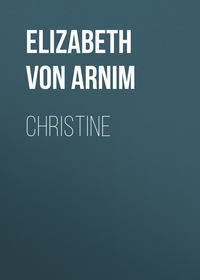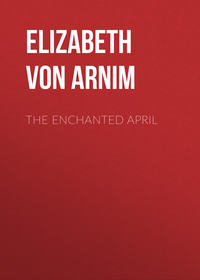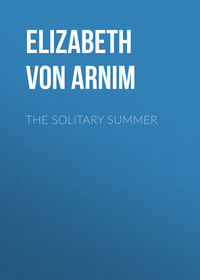 полная версия
полная версияThe Benefactress
"Guten Morgen," said Marie, as Anna came into the drawing-room on her way out through its French windows.
"Guten Morgen," said Anna cheerfully.
Marie leaned on her broom and watched her go down the garden, greedily taking in every detail of her clothes, profoundly interested in a being who went out into the mud where nobody could see her with such a dress on, and whose shoes would not have been too big for Marie's small sister aged nine.
The evening before, indeed, Marie had beheld such a vision as she had never yet in her life seen, or so much as imagined; her new mistress had appeared at supper in what was evidently a herrschaftliche Ballkleid, with naked arms and shoulders, and the other ladies were attired in much the same way. The young Fräulein, it is true, showed no bare flesh, but even she was arrayed in white, and her hair magnificently tied up with ribbons. Marie had rushed out to tell the cook, and the cook, refusing to believe it, had carried in a supererogatory dish of compot as an excuse for securing the assurance of her own eyes; and Bertha from the farm, coming round with a message from the Frau Oberinspector, had seen it too through the crack of the kitchen door as the ladies left the dining-room, and had gone off breathlessly to spread the news; and the post cart just leaving with the letters had carried it to Lohm, and every inhabitant of every house between Kleinwalde and Stralsund knew all about it before bedtime. "What did I tell thee, wife?" said Dellwig, who, in spite of his superiority to the sex that served, listened as eagerly as any member of it to gossip; and his wife was only too ready to label Anna mad or eccentric as a slight private consolation for having passed out of the service of a comprehensible German gentleman into that of a woman and a foreigner.
Unconscious of the interest and curiosity she was exciting for miles round, pleased by Marie's artless piety, and filled with kindly feelings towards all her neighbours, Anna stood at the end of the garden looking over the low hedge that divided it from the marsh and the sea, and thought that she had never seen a place where it would be so easy to be good. Complete freedom from the wearisome obligations of society, an ideal privacy surrounded by her woods and the water, a scanty population of simple and devoted people—did not Dellwig shed tears at the remembrance of his master?—every day spent here would be a day that made her better, that would bring her nearer to that heaven in which all good and simple souls dwelt while still on earth, the heaven of a serene and quiet mind. Always she had longed to be good, and to help and befriend those who had the same longing but in whom it had been partially crushed by want of opportunity and want of peace. The healthy goodness that goes hand in hand with happiness was what she meant; not that tragic and futile goodness that grows out of grief, that lifts its head miserably in stony places, that flourishes in sick rooms and among desperate sorrows, and goes to God only because all else is lost. She went round the house and crossed the road into the forest. The fresh wind blew in her face, and shook down the drops from the branches on her as she passed. The pine needles of other years made a thick carpet for her feet. The sun gleamed through the straight trunks and warmed her. The restless sighing overheard in the tree tops filled her ears with sweetest music. "I do believe the place is pleased that I have come!" she thought, with a happy laugh. She came to a clearing in the trees, opening out towards the north, and she could see the flat fields and the wide sky and the sunshine chasing the shadows across the vivid green patches that she had learned were winter rye. A hole at her feet, where a tree had been uprooted, still had snow in it; but the larks were singing above in the blue, as though from those high places they could see Spring far away in the south, coming up slowly with the first anemones in her hands, her face turned at last towards the patient north.
The strangest feeling of being for the first time in her life at home came over Anna. This poor country, how sweet and touching it was. After the English country, with its thickly scattered villages, and gardens, and fields that looked like parks, it did seem very poor and very empty, but intensely lovable. Like the furniture of her house, it struck her as symbolic in its bareness of the sturdier virtues. The people who lived in it must of necessity be frugal and hard-working if they would live at all, wresting by sheer labour their life from the soil, braced by the long winters to endurance and self-denial, their vices and their languors frozen out of them whether they would or no. At least so thought Anna, as she stood gazing out across the clearing at the fields and sky. "Could one not be good here? Could one not be so, so good?" she kept on murmuring. Then she remembered that she had been asking herself vague questions like this ever since her arrival; and with a sudden determination to face what was in her mind and think it out honestly, she sat down on a tree stump, buttoned her coat up tight, for the wind was blowing full on her, and fell to considering what she meant to do.
Susie did not go down to breakfast, but stayed in her bedroom on the sofa drinking a glass of milk into which an egg had been beaten, and listening to Hilton's criticisms of the German nation, delivered with much venom while she packed. But Hilton, though her contempt for German ways was so great as to be almost unutterable, was reconciled to a mistress who had so quickly given in to her wish to be taken back to Hill Street, and the venom was of an abstract nature, containing no personal sting of unfavourable comparisons with duchesses; so that Susie was sipping her milk in a fairly placid frame of mind when there was a knock at the door, and Anna asked if she might come in.
"Oh, yes, come in. Have you looked out the trains?"
"Yes. There's only one decent one, and you'll have to leave directly after luncheon. Won't you stay, Susie? You'll be so tired, going home without resting."
"Can't we leave before luncheon?"
"Yes, of course, if you prefer to lunch at Stralsund."
"Much. Have you ordered the shandrydan?"
"Yes, for half-past one."
"Then order it for half-past twelve. Hilton can drive with me."
"So I thought."
"Has that wretch been rubbing fish oil on it again?"
"I don't think so, after what I said yesterday."
"I shouldn't think what you said yesterday could have frightened him much. You beamed at him as though he were your best friend."
"Did I?"
Anna was looking odd, Susie thought, and answering her remarks with a nervous, abstracted air. She had apparently been out, for her dress was muddy, and she was quite rosy, and her hair was not so neat as usual. She stood about in an undecided sort of way, and glanced several times at Hilton on her knees before a trunk.
"Is that all the breakfast you are going to have?" she asked, becoming aware of the glass of milk.
"What other breakfast is there to have?" snapped Susie, who was hungry, and would have liked a great deal more.
"Well, the eggs and butter are very nice, anyway," said Anna, quite evidently thinking of other things.
"Now what has she got into her head?" Susie asked herself, watching her sister-in-law with misgiving. Anna's new moods were never by any chance of a sort to give Susie pleasure. Aloud she said tartly, "I can't eat eggs and butter by themselves. I shouldn't have had anything at all if it hadn't been for Hilton, who went into the kitchen and made me this herself."
"Excellent Hilton," said Anna absently. "Haven't you done packing yet, Hilton?"
"No, m'm."
Anna sat down on the end of the sofa and began to twist the frills of Susie's dressing-gown round her fingers.
"I haven't closed my eyes all night," said Susie, putting on her martyr look, "nor has Hilton."
"Haven't you? Why not? I slept the sleep of the just—better, indeed, than any just that I ever heard of."
"What, didn't that man go into your room?"
"What man? Oh, yes, Miss Leech was telling me about it. He lit the stoves, didn't he? I never heard a sound."
"You must have slept like a log then. Any one in the least sensitive would have been frightened out of their senses. I was, and so was Hilton. I wouldn't spend another night in this house for anything you could give me."
It appeared that Susie really had just cause for complaint. She had been nervous the night before after Hilton had left her, unable to sleep, and scared by the thought of their defencelessness—six women alone in that wild place. She wished then with all her heart that Dellwig did live in the house. Rats scampering about in the attic above added to her terrors. The wind shook the windows of her room and howled disconsolately up and down. She bore it as long as she could, which was longer than most women would have borne it, and then knocked on the wall dividing her room from Hilton's. But Hilton, with the bedclothes over her head and all the candles she had been able to collect alight, would not have stirred out of her room to save her mistress from dying; and Susie, desperate at the prospect of the awful hours round midnight, made one great effort of courage and sallied out to fetch her. Poor Susie, standing shivering before her maid's bolted door, scantily clothed, anxiously watching the flame of her candle that threatened each second to be blown out, alone on the wide, draughty landing, frightened at the sound of her own calls mingling weirdly with the creakings and hangings of the tempest-shaken house, was an object deserving of pity. It took some minutes to induce Hilton to open the door, and such minutes Susie had not, in the course of an ordered and normal existence, yet passed. They both went into Susie's room, locked themselves in, and Hilton lay down on the sofa; and after a long time they fell into an uneasy sleep. At half-past three Susie started up in bed; some one was trying to open the door and knocking. The candles had burnt themselves out, and she could not tell what time it was, but thought it must be early morning and that the servant wanted to bring her hot water; and she woke Hilton and bade her open the door. Hilton did so, gave a faint scream, and flung herself back on the sofa, where she lay as one dead, her face buried in the pillow. A man with a lantern and no shoes on was at the door, and came in noiselessly. Susie was never nearer fainting in her life. She sat in her bed, her cold hands clasped tightly round her knees, her eyes fixed on this dreadful apparition, unable to speak or move, paralysed by terror. This was the end, then, of all her hopes and ambitions—to come to Pomerania and die like a dog. Then the sickening feeling of fear gave way to one of overwhelming wrath when she found that all the man wanted was to light her stove. On the same principle that a child is shaken who has not after all been lost or run over, she was speechless with rage now that she found that she was not, after all, to be murdered. He was a very old man, and the light from the lantern cast strange reflections on his face and figure as he crouched before the stove. He mumbled as he worked, talking to the fire he was making as though it were a person. "Du willst nicht, brennen, Lump? Was? Na, warte mal!" And when he had finished, crept out again without glancing at the occupants of the room, still mumbling.
"It's the custom of the country, I suppose," said Anna.
"Is it? Well the sooner we get out of such a country the better. You are determined to stay in spite of everything? I can tell you I don't at all like my child being here, but you force me to leave her because you know very well that I can't let you stay here alone."
Anna glanced at Hilton, folding a dress with immense deliberation.
"Oh, Hilton knows what I think," said Susie, with a shrug.
"But she doesn't know what I think," said Anna. "I must talk to you before you leave, so please let her finish packing afterwards. Go and have your breakfast, Hilton."
"Did you say breakfast, m'm?" inquired Hilton with an innocent look.
"Breakfast?" repeated Susie; "poor thing, I'd like to know how and where she is to get any."
"Well, then, go and don't have your breakfast," said Anna impatiently. She had something to tell Susie that must be told soon, and was not in a mood to bear with Hilton's ways.
"How hospitable," remarked Susie as the door closed. "Really you are a delightful hostess."
Anna laughed. "I don't mean to be brutal," she said, "but if we can exist on the food without looking tragic I suppose she can too, especially as it is only for one day."
"My one consolation in leaving Letty here is that she will be dieted in spite of herself. I expect you to bring her back quite thin."
Anna got up restlessly and went to the window.
"And whatever you do, don't forget that the return tickets only last till the 24th. But you'll be sick of it long before then."
Anna turned round and leaned her back against the window. The strong morning light was on her hair, and her face was in shadow, yet Susie had a feeling that she was looking guilty.
"Susie, I've been thinking," she said with an effort.
"Really? How nice."
"Yes, it was, for I found out what it is that I must do if I mean to be happy. But I'm afraid that you won't think it nice, and will scold me. Now don't scold me."
"Well, tell me what it is." Susie lay staring at Anna's form against the light, bracing herself to hear something disagreeable. She knew very well from past experience that Anna's new plan, whatever it was, was certain to be wild and foolish.
"I am going to stay here."
"I know you are, and I know that nothing I can say will make you change your mind. Peter is just like you—the more I show him what a fool he's going to make of himself the more he insists on doing it. He calls it determination. Average people like myself, with smaller and more easily managed brains than you two wonders have got, call it pigheadedness."
"I don't mean only for Letty's holidays; I mean for good."
"For good?" Susie opened her mouth and stared in much the same blank consternation that Dellwig had shown on hearing that she did not like eating pig.
"Don't be angry with me," said Anna, coming over to the sofa and sitting on the floor by Susie's side; and she caught hold of her hand and began to talk fast and eagerly. "I always intended spending this money in helping poor people, but didn't quite know in what way—now I see my way clearly, and I must, must go it. Don't you remember in the catechism there's the duty towards God and the duty towards one's neighbour–"
"Oh, if you're going to talk religion–" said Susie, pulling away her hand in great disgust.
"No, no, do listen," said Anna, catching it again and stroking it while she talked, to Susie's intense irritation, who hated being stroked.
"If you are going into the catechism," she said, "Hilton had better come in again. It might do her good."
"No, no—I only wanted to say that there's another duty not in the catechism, greater than the duty towards one's neighbour–"
"My dear Anna, it isn't likely that you can improve on the catechism. And fancy wanting to, at breakfast time. Don't stroke my hand—it gives me the fidgets."
"But I want to explain things—do listen. The duty the catechism leaves out is the duty towards oneself. You can't get away from your duties, you know, Susie–" And she knit her brows in her effort to follow out her thought.
"My goodness, as though I ever tried! If ever a poor woman did her duty, I'm that woman."
"—and I believe that if I do those two duties, towards my neighbour and myself, I shall be doing my duty towards God."
Susie gave her body an impatient twist. She thought it positively indecent to speak of sacred things so early in the morning in cold blood. "What has this drivel to do with your stopping here?" she asked angrily.
"It has everything to do with it—my duty towards myself is to be as happy and as good as possible, and my duty towards my neighbour–"
"Oh, bother your neighbour and your duty!" cried Susie in exasperation.
"—is to help him to be good and happy too."
"Him? Her, I hope. Don't forget decency, my dear. A girl has no duties whatever towards male neighbours."
"Well, I do mean her," said Anna, looking up and laughing.
"So you think that by living here you'll make yourself happy?"
"Yes, I do—I do think so. Perhaps I am wrong, and shall find out I'm wrong, but I must try."
"You'll leave all your friends and relations and stay in this God-forsaken place where you can't even live like a lady?"
"Uncle Joachim said it was my one chance of leading the better life."
"Unutterable old fool," said Susie with bitterest contempt. "That money, then, is going to be thrown away on Germans? As though there weren't poor people enough in England, if your ambition is to pose as a benefactress!"
"Oh, I don't want to pose as anything—I only want to help unhappy wretches," cried Anna, laying her cheek caressingly on Susie's unwilling hand. "Now don't scold me—forgive me if I'm silly, and be patient with me till I find out that I've made a goose of myself and come creeping back to you and Peter. But I must do it—I must try—I will do what I think is right."
"And who are the wretches, pray, who are to be made happy?"
"Oh, those I am sorriest for—that no one else helps—the genteel ones, if I can only get at them."
"I never heard of genteel wretches," said Susie.
Anna laughed again. "I was thinking it all out in the forest this morning," she said, "and it suddenly flashed across me that this big roomy house was never meant not to be used, and that instead of going to see poor people and giving them money in the ordinary way, it would be so much better to let women of the better classes, who have no money, and who are dependent and miserable, come and live with me and share mine, and have everything that I have—exactly the same, with no difference of any sort. There is room for twelve at least, and wouldn't it be beautiful to make twelve people, who had lost all hope and all courage, happy for the rest of their days?"
"Oh, the girl's mad!" cried Susie, springing up from the sofa, no longer able to bear herself. She began to walk about the room, not knowing what to say or do, absolutely without sympathy for beneficent impulses, at all times possessed of a fine scorn for ideals, feeling that no argument would be of any avail with an Estcourt whose mind was made up, shocked that good money, so hard to get, and so very precious when got, should be thrown away in such a manner, bewildered by the difficulties of the situation, for how could a girl of Anna's age live alone, and direct a house full of objects of charity? Would the objects themselves be a sufficient chaperonage? Would her friends at home think so? Would they not blame her, Susie, for having allowed all this? As though she could prevent it! Or would they expect her to stay with Anna in this place till she should marry? As though anybody would ever marry such a lunatic! "Mad, mad, mad!" cried Susie, wringing her hands.
"I was afraid that you wouldn't like it," said the culprit on the floor, watching her with a distressed face.
"Like it? Oh—mad, mad!" And she continued to walk and wring her hands.
"Well, you'll stay, then," she said, suddenly stopping in front of Anna, "I know you well enough, and shall waste no breath arguing. That infatuated old man's money has turned your head—I didn't know it was so weak. But look into your heart when I am gone—you'll have time enough and quiet enough—and ask yourself honestly whether what you are going to do is a proper way of paying back all I have done for you, and all the expense you have been. You know what my wishes are about you, and you don't care one jot. Gratitude! There isn't a spark of it in your whole body. Never was there a more selfish creature, and I can't believe that ingratitude and selfishness are the stuff that makes saints. Don't dare to talk any more rot about duty to your neighbour to me. An Englishwoman to come and spend her money on German charities–"
"It's German money," murmured Anna.
"And to live here—to live here—oh, mad, mad!" And Susie's indignation threatening to choke her, she resumed her walk and her gesticulations, her high heels tapping furiously on the bare boards.
She longed to take Letty and Miss Leech away with her that very morning, and punish Anna by leaving her entirely alone; but she did not dare because of Peter. Peter was always on Anna's side when there were differences, and would be sure to do something dreadful when he heard of it—perhaps come and live here too, and never go back to his wife any more. Oh, these half Germans! Why had she married into a family with such a taint in its blood? "You will have to have some one here," she said, turning on Anna, who still sat on the floor by the sofa, a look on her face of apology and penitence mixed with firmness that Susie well knew. "How can you stay here alone? I shall leave Miss Leech with you till the end of the holidays, though I hate to seem to encourage you; but then you see I do my duty and always have, though I don't talk about it. When I get home I shall look for some elderly woman who won't mind coming here and seeing that you don't make yourself too much of a by-word, and the day she comes you are to send me back my child."
"It is good of you to let me keep Letty, dear Susie–"
"Dear Susie!"
"But I don't mean to be a by-word, as you call it," continued Anna, the ghost of a smile lurking in her eyes, "and I don't want an Englishwoman. What use would she be here? She wouldn't understand if it was a German by-word that I turned into. I thought about asking the parson how I had better set about getting a German lady—a grave and sober female, advanced in years, as Uncle Joachim wrote."
"Oh, Uncle Joachim–" Susie could hardly endure to hear the name. It was that odious old man who had filled Anna's head with these ideas. To leave her money was admirable, but to influence a weak girl's mind with his wishy-washy German philosophy about the better life and such rubbish, as he evidently had done during those excursions with her, was conduct so shameful that she found no words strong enough to express her opinion of it. Everyone would blame her for what had happened, everyone would jeer at her, and say that the moment an opportunity of escape had presented itself Anna had seized it, preferring an existence of loneliness and hardship—any sort of existence—to all the pleasures of civilised life in Susie's company. Peter would certainly be very angry with her, and reproach her with not having made Anna happy enough. Happy enough! The girl had cost her at least three hundred a year, what with her expensive education and all her clothes since she came out; and if three hundred good pounds spent on a girl could not make her happy, she'd like to know what could. And no one—not one of those odious people in London whom she secretly hated—would have a single word of censure for Anna. No one ever had. All her vagaries and absurdities during the last few years when she had been so provoking had been smiled at, had been, Susie knew, put down to her treatment of her. Treatment of her, indeed! The thought of these things made Susie writhe. She had been looking forward to the next season, to having her pretty sister-in-law with her in the happy mood she had been in since she heard of her good fortune, and had foreseen nothing but advantages to herself from Anna's presence in her house—an Anna spending and not being spent upon, and no doubt to be persuaded to share the expenses of housekeeping. And now she must go home by herself to blame, scoldings, and derision. The prospect was almost more than she could bear. She went to the door, opened it, and turning to Anna fired a parting shot. "Let no one," she said, her voice shaken by deepest disgust, "who wants to be happy, ever spend a penny on her husband's relations."
And then she called Hilton; nor did she leave off calling till Hilton appeared, and so prevented Anna from saying another word.
CHAPTER VIII
But if Susie's rage was such that she refused to say good-bye, and terrified Miss Leech while she was waiting in the hall for the carriage by dark allusions to strait-waistcoats, when the parson was taken into Anna's confidence after dinner on the following night his raptures knew no bounds. "Liebes, edeldenkendes Fräulein!" he burst out, clasping his hands and gazing with a moist, ecstatic eye at this young sprig of piety. He was a good man, not very learned, not very refined, sentimental exceedingly, and much inclined to become tearfully eloquent on such subjects as die liebe kleine Kinder, die herrliche Natur, die Frau als Schutzengel, and the sacredness of das Familienleben.









